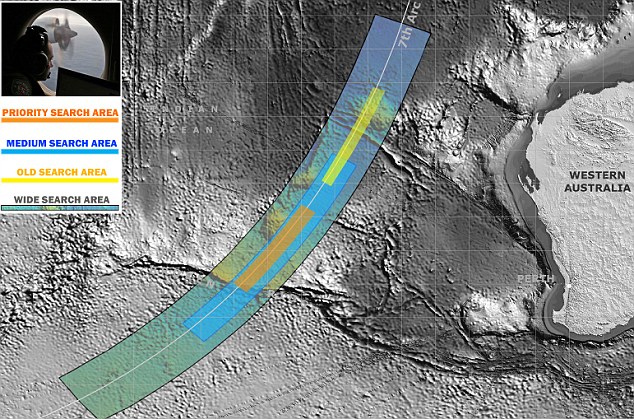
Authorities are "cautiously optimistic" as a new, $52 million dollars phase in the search for MH370 will begin nearly five months after the Malaysia Airlines mysteriously flight disappeared.
Australian authorities will oversee this next phase, which will begin in September and see underwater vehicles carefully scan 60,000 square km of the sea floor in the southern Indian Ocean, off the west coast of Australia. The sonar data will be sent to the vessels and interpreted by personnel on board and then reviewed by analysts on shore.
'We are cautiously optimistic we will locate the missing aircraft in the search zone,' Deputy Prime Minister Warren Truss said.
So far, there have been no signs of the missing Malaysia Airlines plane, which was flying from Kuala Lumpur to Beijing with 239 people on board. It lost contact with air traffic control on March 8, 2014 as it was transitioning between Malaysian and Vietnamese airspace.
Over the past several months, the Australian Transport Safety Bureau (ATSB) has been conducting a bathymetric survey to map the sea floor in the search area. A 32,000 sq km of the 60,000 sq km search zone, which is approximately 80km wide and 700km long, has been mapped thus far.
The search has not come without a price tag: the Australian government has committed to spending $80-$90 million on the MH370 search operation.
The government has contracted Dutch company Fugro to conduct the search operation, which will cost up to $52 million.
Martin Dolan, Chief Commissioner of the ATSB, said the bathymetric survey is a crucial step before commencing the underwater search, revealing underwater volcanoes, canyons and valleys, which could make debris difficult to spot.
"We are still...working out the details of the techniques to be used, which will vary depending on the topography of the ocean floor," said Dolan.
"So there's a range of possibilities. We haven't gotten the full detail of our search plan because we have to do that on a collaborative basis with Fugro. So there's no simple answer."
Truss added that it was not clear how long the operation would take.
'Obviously we hope to find it on the first day, but it could take a year,' he said.
Mr Truss said the search for the wreckage of MH370 was 'on schedule' and had not been affected by downing of Malaysia Airlines flight MH17, from Amsterdam to Melbourne, which was believed to be shot down over Ukraine, killing all 298 passengers and crew on board on July 17.
'Obviously Malaysia Airlines and the Malaysian government have to deal with... two extraordinary circumstances, two unique situations to deal with,' he said.
The first phase of the search for the missing plane was a surface search of probable impact areas, conducted by an international fleet of aircraft and ships, which concluded on April 28 and garnered no results.
An acoustic search, accompanied by a search of the ocean floor in the vicinity of the acoustic detentions was then conducted, also without success. The ocean floor search was completed on May 28.
















